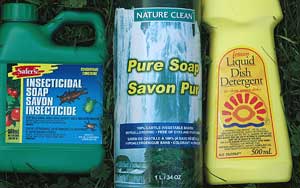OverviewCurrently, the only pesticides that are permitted by the PMRA for control of chinch bug are diazinon (an organophosphate) and Sevin (carbaryl, a carbamate pesticide). (See List). Both are cholinesterase inhibitors that are recognized as unsafe in the domestic environment by pesticide regulating agencies in Canada and the U.S, particularly for children, and have been targeted for removal from the domestic market. In the U.S., several alternative, much more benign materials for humans and the environment, or 'soft' pesticides, are also registered for control of chinch bug, such as insecticidal soap. (Insecticidal soap is a refined natural soap which is no more hazardous than natural soap; its advantages over household soap are consistency of product, generally higher efficacy and lower toxicity to plants.) However, while several insecticidal soap products are registered in Canada for use against a variety of pests on houseplants and in gardens, none have been approved for use against chinch bug. The befuddling result is that the only pesticides that can legally be used against chinch bug in Canada are those which the PMRA itself considers unsafe in the domestic environment, while we cannot use insecticidal soap in our own backyards. (Nor can lawncare companies use household soap as a substitute.) Why are insecticidal soap products not approved for use against chinch bug in Canada? It could be because (i) no manufacturer has applied for a product extension that would allow such use, or (ii) because applications for such extensions have been turned down by the PMRA. It's possible that an application(s) for a product extension to include chinch bug in the list of target pests is currently being considered.* We are not privy to this information because the PMRA does not provide any information unless and until an application is actually approved.
Household soap can be used in place of insecticidal soap to control chinch bug (and other pests), although it may be less effective, and should be tested for possible damage to grass. Natural soaps, rather than detergents are safest. (See Household Soap.) Correspondence with the PMRA indicates very clearly that lawncare companies are NOT entitled to use household soap for pest control. The situation in regard to individuals, however, is not clear. Whether or not individuals can use household soap to control chinch bug is an important issue. In 2003 and 2004, the 3rd parties responsible for issuing pesticide permits in Halifax Regional Municipality (Clean Nova Scotia in 2003 and Ecology Action Centre in 2004) understood they could NOT legally advise residents to try using household soap to control chinch bugs. Many of the situations in which permits were issued for use of diazinon or Sevin to control chinch bug could have been dealt with adequately by applications of household soap, (or by Insecticidal Soap if it had been registered for this use). Over the period April 23 to Dec. 8, 2004, I made use of the PMRA Pest Managament Information Service (www.pmra-arla.gc.ca/english/aboutpmra/infoserv-e.html) to attempt to clarify whether it is legal for individuals to use household soap to control chinch big (and other lawn pests) " ..lawncare companies cannot use dish soap as this would become a product/service rendered making a pesticidal claim, thus subject to the PCPA but individuals may use dish soap on their properties as this is not a method that requires registration under the PCPA. "I followed up with further queries to the PMRA to confirm the statement and was told, yes, soap can be used as a physical control for chinch bug. I noted that the word 'physical' was inserted in all subsequent references to use of household soap. I then queried (Sept. 10, 2004) how the PMRA defines 'physical control' and where on their website one can find out what methods do NOT require registration under the Pest Control Products Act. In a reply issued on Dec 8, the PMRA did not address the specific questions, instead simply maintained that all of the needed information is on their website.
-David Patriquin 5 Feb. 2005 Details of correspondence with the PMRAA major objective of this web site is to present accurate information related to use of 'alternatives to pesticides' such as soap and for that reason that I have attempted to sort out the various issues related to use of soap. To avoid any ambiguities in reporting on what I have been told by the PMRA, the questions to the PMRA and answers received are given as posed and received in the following links.Separate: Letter of Sept. 10 with Specific Questions UPDATE, August 2007Based on the PMRA's apparent change in position in regard to the use of household soap by homeowners, in 2005 the Ecology Action Centre Pesticide Project (which had the contract for administering the Pesticide By-law) began to advise residents who had applied for a permit to use a registered pesticide to control chinch bug to try household soap. I understand that initially they also distributed premixed 2% soap solution, but were told by the PMRA that while they could suggest use of household soap, they could not distribute a soap solution.The following is reported in the HRM's Pesticide By-law Program Overview Report for 2006.
In 2007, a soap-pyrethrin product was registered by the PMRA, providing the first alternative to carbaryl that could be used by lawncare companies for chinch control. Since pyrethrins are permitted under the Pestcide By-law, no special permit from HRM is required for lawncare companies or individuals to use this product. However, pyrethins are far from innocuous materials, epsecially if used extensively, and there is still no pure insectidal soap product registered for use on chinch. See Update: Use of Pyrethrins and Neem Oil to Control Chinch Bug. Page posted 5 Feb. 2005 (Completely revised from earlier Updates on the Soap Issue) Update added 18 Aug. 2007 | |||||||
